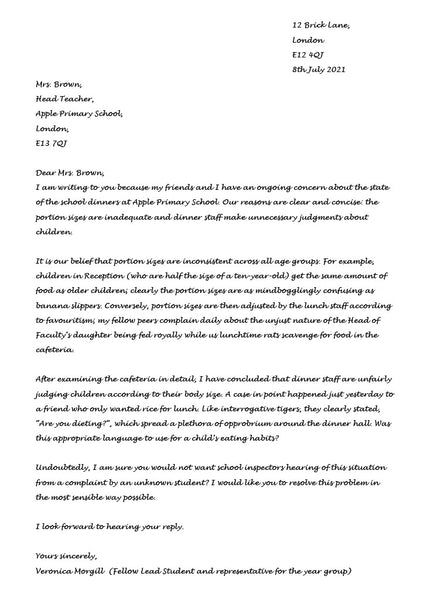Children's writing: a persuasive, formal letter
20.07.21
Thank you for sharing your persuasive letter with us, Aditi! I am so glad that you have, because remembering how to set a letter out can be tricky, and so can remembering how to structure a persuasive argument. So, this will be excellent as a guide for other students. I was impressed with your perseverance to ensure that a sentence made absolute sense and had all the correct punctuation to do this. You revised and revised until this was just right.
You have some excellent, high-level sentence openers to start new paragraphs ('It is our belief...', 'After examining ...' , 'Conversely' and 'Undoubtedly'). You've included a rhetorical question and high-level vocabulary (a 'plethora' and 'opprobrium') as well as figurative language (simile, metaphor and hyperbole). This writing has it all. A huge well done.

12 Brick Lane,
London,
E12 4QJ
8th July 2021
Mrs. Brown,
Head Teacher,
Apple Primary School,
London,
E13 7QJ
Dear Mrs. Brown,
I am writing to you because my friends and I have an ongoing concern about the state of the school dinners at Apple Primary School. Our reasons are clear and concise: the portion sizes are inadequate and dinner staff make unnecessary judgments about children.
It is our belief that portion sizes are inconsistent across all age groups. For example, children in Reception (who are half the size of a ten-year-old) get the same amount of food as older children; clearly the portion sizes are as mindbogglingly confusing as banana slippers. Conversely, portion sizes are then adjusted by the lunch staff according to favouritism; my fellow peers complain daily about the unjust nature of the Head of Faculty’s daughter being fed royally while us lunchtime rats scavenge for food in the cafeteria.
After examining the cafeteria in detail, I have concluded that dinner staff are unfairly judging children according to their body size. A case in point happened just yesterday to a friend who only wanted rice for lunch. Like interrogative tigers, they clearly stated, “Are you dieting?”, which spread a plethora of opprobrium around the dinner hall. Was this appropriate language to use for a child’s eating habits?
Undoubtedly, I am sure you would not want school inspectors hearing of this situation from a complaint by an unknown student? I would like you to resolve this problem in the most sensible way possible.
I look forward to hearing your reply.
Yours sincerely,
Veronica Morgill (Fellow Lead Student and representative for the year group)
